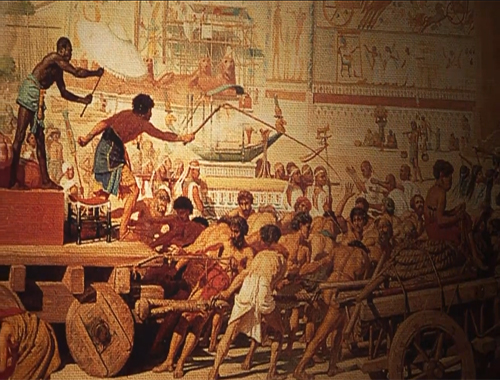Sincerity, the Condition for the Acceptance of Actions
- Details
- Hits: 4474
Sincerity, the Condition for the Acceptance of Actions
The second of the issues that we raised regarding the value of faith is what influence faith can have in the acceptance of actions.
Previously, in relating the proofs of those who say that the good deeds of unbelievers are acceptable to God, we said that they say that the goodness and badness of actions is related to their essence. A good deed, whether of a believer or an unbeliever, is good by its essence and must inevitably be accepted by God, since good is good no matter who does it and bad is bad no matter who does it, and since God’s relation to all people is the same.
Now, we would like to add that though what has been said in the above reasoning is correct, a basic point has been neglected in it. To explain this point, we must first explain another term from the subject of the principles of jurisprudence, which is that goodness and evil are of two types: action-related, and actor-related.
Every action has two aspects, and every one of the two aspects has a separate ruling with regard to goodness or badness. It is possible for an action to be good from one dimension and not be good from the other. Similarly, the reverse is possible; and it is also possible for an action to be good or bad from both dimensions.
The two dimensions consist of the action’s beneficial or harmful effect in the external world and human society, and the action’s association to its doer and that person’s spiritual motivations which caused that action and the goal to which the doer aspired by performing it.
From the point of view of the former, one must determine the extent of the beneficial or harmful effect of the action. And from the point of view of the latter, one must determine what type of action the doer has performed in his or her mental and spiritual framework and what goal he or she has pursued.
Human actions, in terms of the trajectory of their beneficial and harmful effects, are recorded in books of history, and history passes Judgement about them; it praises them or condemns them. But the aspect of attribution to the human soul is only recorded in the otherworldly books [of human deeds]. Books of history like great and influential actions and praise such actions; but the Divine otherworldly and celestial books, in addition to this aspect, are in search of actions that have spirit.
The Qur’Än says:
الَّذÙÙŠ خَلَقَ الْمَوْتَ ÙˆÙŽ الْØَيٌاةَ Ù„ÙيَبْلÙÙˆÙŽÙƒÙمْ أَيّÙÙƒÙمْ Ø£ÙŽØْسَن٠عَمَلاً
“Who created death and life to try you as to which of you is the best in deeds.”[52]
It refers to “the best deeds,” not “the most deeds,” since the important thing is for us to know that when we perform an action under the influence of spiritual motives, aside from the outward appearance of the action – which is a series of movements and has its own social effects and value – spiritually we actually move in a certain direction and traverse a certain path.
The issue is not so simple as to say, “All that exists is the ‘action,’ the work, the muscular energy that is spent. As for the thoughts and intentions, their value lies only in preparing for the action; they are no more than a mentality and preliminary. And whatever the preliminary may be, the main thing is the action itself.” To the contrary, the importance of the thought and the intention is not less than that of the action. Such a way of thinking, which maintains the primacy of action rather than the primacy of the intention and belief, is a materialistic thought. Under the names “objectivity” and “subjectivity” it gives the belief and intention behind the action no more than preliminary value. Leaving aside the fact that the invalidity of this school is clear in its own right, what is certain is that the Qur’Änic teachings cannot be interpreted on the basis of such ways of thinking.
In the view of the Qur’Än, our true personality and self is our spirit. With every voluntary action, the spirit moves from potentiality to actuality and acquires an effect and an attribute commensurate to its own intention and aim. These effects and habits become a part of our personality and carry us to a world appropriate to themselves from among the realms of existence.
Thus, from the first dimension the goodness and evilness of actions depends on the external effect of those actions; and from the second dimension goodness and evilness depends on the manner in which that action was performed by its doer. In the first case, our position about an action is based on its external and societal outcome; and in the second case, it is based on the internal and mental effect of the action on its doer.
If a person establishes a hospital or performs some other charitable deed with respect to the cultural, health, or economic affairs of a country, without doubt from a societal point of view and in the view of history, that action is good. That is, it is an act that benefits God’s creation. In this regard, it doesn’t matter what the intention was of the person who established the hospital or other philanthropic institution. Whether the intention is to show off and fulfil one’s selfish instincts or whether the intention is altruistic and unselfish, from a societal point of view a charitable institution has come into being. The ruling of history with regard to people’s actions is always from this aspect and in view of this particular dimension. History has no concern with people’s intentions. When the masterpieces of art or architecture in IsfahÄn are mentioned, no one is concerned with what intention or aim the maker of the Shaykh LuÅ¥fullÄh Masjid, the ShÄh Masjid, or the Thirty-Three Bridge had; history sees the outward form and calls the action a “good deed.”
However, in ascertaining an action’s actor-related goodness, our attention doesn’t go to the societal and external effect of the action. Instead, from this aspect, we are concerned with how the action relates to its doer. In this reckoning, it is not enough for the action to be beneficial in order for it to be considered a “good deed.” What counts is what the doer’s intention was in performing the action, and what goal he or she wanted to attain. If the doer had a good intention and aim and performed the action with a good motive, that action is good – that is, it possesses actor-related goodness.
The action itself is two-dimensional; that is, it proceeds in two dimensions: the historical and societal dimension, and the spiritual dimension. But if the doer performed the action to show off or to attract material benefit, the action is one-dimensional. It goes forward only in time and in history, and not in the spiritual dimension; and in IslÄmic terminology, the action does not ascend to the higher realm. In other words, in such instances, the doer has served society and raised its level but has not benefited him or herself, and may actually have committed treachery. Instead of ascending spiritually by performing the action, the doer’s soul may have descended to a lower spiritual level.
Of course, our intent is not that the action-related goodness of an action is totally separate from its actor-related goodness, and that from a spiritual point of view a person should have nothing to do with actions that are beneficial to society. The intent is that a socially beneficial deed is only spiritually beneficial when the spirit, by performing that action, has travelled a spiritual path as well, having left the station of selfishness and pleasure-seeking and set foot on the station of sincerity and purity.
The relation between action-related goodness and actor-related goodness is the relation of the body to the spirit. A living being is a combination of spirit and body. Likewise, the second type of goodness must be breathed into the body of an action possessing the first type of goodness for that action to come alive.
Thus, the rational proof of the so-called intellectuals is fallacious. This proof states that “God’s relationship with all His creatures is equal, and the goodness or evilness of actions is innate to them. Thus good deeds are equal for all people. And the corollary of these two equalities is that in the hereafter, the recompense of believers and unbelievers shall be the same.” In this reasoning, the actions and the equality of the creatures before the Creator have been given attention; but the doer and his or her personality, aim, motive, and spiritual path – all of which necessarily cause actions to be dissimilar and cause a difference among them similar to the difference between the living and the dead – has been forgotten. They say, “What difference does it make for God whether the doer of a good deed recognizes Him or not, or is familiar with Him or not? Whether he or she performed the action for His pleasure or with some other purpose, whether the intention be seeking nearness to God or not?”
The answer is that it makes no difference to God, but it makes a difference for that person him or herself. If the person doesn’t recognize God, he or she will perform one type of spiritual action and another type if he or she is familiar with God. If one doesn’t know God, one’s action will be one-dimensional; the action will have only action-related and historical goodness. But if one knows God, one’s action will be two-dimensional and will have actor-related and spiritual goodness. If one knows God, one’s action and one’s self will ascend towards God, and if one doesn’t know God one will not ascend. In other words, it makes no difference for God, but it does make a difference for the action. In one case, the action will be a living, ascending action, and in the other case it will be a dead, descending action.
They say that God, who is Wise and Just, will certainly not nullify the good deeds of a person on account of not having a relationship of friendship with Him.
We too believe that God will not nullify them, but we must see whether a person who doesn’t recognize God actually performs a good deed that is good both in its effect and its relation to its doer, good both from the aspect of the societal order as well as from the doer’s spiritual aspect. The fallacy arises because we have supposed that for an action to be beneficial to society suffices for it to be considered a “good deed.” To suppose the impossible, if a person doesn’t know God and yet ascends toward God through his or her action, without doubt God will not send that person back. But reality is that a person who doesn’t know God doesn’t break the curtain to enter the spiritual realm, doesn’t traverse any of the stations of the soul, and doesn’t ascend towards God’s spiritual realm in order for his or her action to acquire a spiritual aspect and a form that will be a source of pleasure, felicity, and salvation for him or her. The acceptance of an action by God is nothing other than for the action to possess these qualities.
One of the primary differences between Divine laws and human laws is this very point; Divine laws are two-dimensional, and human laws are one-dimensional. Human laws have nothing to do with the spiritual order or spiritual advancement of the individual. When a government legislates taxes in the interests of the country, its goal is solely to obtain money and cover the country’s expenses. The government has no concern with the intention of the taxpayer. Does he or she pay taxes freely and willingly out of love for the country and its government, or out of fear? The government’s purpose is only to obtain money; even if the taxpayer curses the government under his or her breath, the government’s purpose has been attained.
Similarly, when a government calls its armed forces to defend the country, it does not concern itself with the intention of the soldiers; it desires the soldiers to fight its enemies in war. It makes no difference to the government whether the soldier fights out of his free will and inclination or out of fear of the gun to his head; or whether his fighting is to show off, as a result of foolish prejudices, or in defence of truth and what is right.
However, Divine laws are not like that. In these laws, monetary dues and warriors are not wanted in absolute terms, but together with a pure intention and desire to seek nearness to God. IslÄm desires actions with a soul, not soulless actions. Thus, if a Muslim pays zakÄt, but with an element of showing off, it is not accepted; if he performs jihÄd, but does it in order to show off, it is not accepted. The Divine law says that a coerced soldier is useless; I want a soldier who has the soul of a soldier, who has accepted the call:
Ø¥Ùنَّ اللٌّهَ اشْتَرَى Ù…ÙÙ†ÙŽ الْــمÙؤْمÙÙ†Ùينَ أَنْÙÙسَهÙمْ ÙˆÙŽ أَمْوٌالَــهÙمْ بÙأَنَّ Ù„ÙŽÙ‡Ùم٠الْجَنَّةَ
“Verily God has purchased from the believers their souls and their belongings in return for Paradise”[53]
and answered it sincerely.
It has been related from the Messenger of IslÄm (S) in a consecutively-narrated tradition among both the Sunnis and ShÄ«`as that he said:
Ø¥Ùنَّمٌا الأَعْمٌال٠بÙالنÙّيٌّاتÙ
“The value of deeds is based on the intention.”
Ù„ÙÙƒÙÙ„ÙÙ‘ امْرÙئ٠مٌا نَوى.
“Every individual shall have what he or she intended.”
لاٌ عَمَلَ Ø¥Ùلاَّ بÙÙ†ÙيَّةÙ
“No deed is accepted without an intention.”[54]
One tradition has been narrated in the following words:
Ø¥Ùنَّمٌا الأَعْمٌال٠بÙالنÙّيَّةÙØŒ ÙˆÙŽØ¥Ùنَّمٌا لامَرْئَ مٌا نَوى، Ùَمَنْ كٌانَتْ Ù‡Ùجْرَتَه٠إÙلـى اللٌّه٠وَرَسÙولÙÙ‡Ù ÙÙŽÙ‡ÙجْرَتÙه٠إÙلـى اللٌّه٠وَرَسÙولÙÙ‡ÙØŒ وَمَنْ كٌانَتْ Ù‡ÙجْرَتÙÙ‡Ù Ù„ÙدّÙنْيٌا ÙŠÙصÙيبÙهٌا أَوْ امْرَأَة٠يَتَزَوَّجÙهٌا ÙÙŽÙ‡ÙجْرَتÙه٠إÙلـى مٌا هٌاجَرَ Ø¥ÙلَيْهÙ.
“The value of actions is in their intention, and a man shall only get that which he intended. So whoever migrated for the sake of God and His Messenger, his migration is towards God and His Messenger; and whoever migrated for the sake of worldly wealth or a woman he wished to marry, his migration is towards that thing.”[55]
ImÄm Ja`far Ibn Muhammad as-ÅœÄdiq (as) said, “Perform your actions for the sake of God and not people, because whatever is for God, (ascends) towards God, and whatever is for the people, does not ascend towards God.”
The intention is the soul of the action, and just as the body of a human being is noble because of the human soul, so too does the nobility of a human being’s action depend on its soul.
What is the soul of an action? The soul of an action is sincerity. The Qur’Än says:
ÙˆÙŽ مٌــآ Ø£ÙÙ…ÙرÙوا Ø¥Ùلاَّ Ù„ÙيَعْبÙدÙوا اللٌّهَ Ù…ÙخْلÙصÙينَ لَه٠الدÙّينَ
“Yet they were not commanded except to worship God, dedicating their faith to Him…”[56]
Quality or Quantity?
From the above discussion, an interesting conclusion can be obtained which is that in the reckoning of God, the value of actions is by their quality rather than their quantity. Inattention to this point has caused some people to make up fantastic stories regarding the extraordinarily valuable actions of holy personages when they see the societal dimension of those actions to be insignificant.
For example, with regard to the ring that ImÄm `AlÄ« Ibn AbÄ« Ťalib (as) bestowed on a beggar while bowing in prayer, about which a verse of the Qur’Än was revealed, they say that the value of that ring was equal to the revenue of greater Syria; and in order for people to believe that, they gave it the form of a tradition. In the view of these people, it was hard to believe that a great verse of Qur’Än would be revealed about the bestowal of an insignificant ring. And since they were unable to believe such a thing, they created a story and raised the ring’s material value. They didn’t stop to think that a ring equal in value to the revenue of all of Syria would not, in the poor and indigent city of MadÄ«nah, be found on the finger of ImÄm `AlÄ« Ibn AbÄ« Ťalib (as). Supposing such a ring was in ImÄm `AlÄ«’s Ibn AbÄ« Ťalib (as) possession, he would not give it to just one beggar; instead, with such a ring he would make MadÄ«nah flourish and save all of the city’s needy.
The intellect of these fantasy-weavers hasn’t understood that for God a great deed has a reckoning different from material reckonings. It is as if they have supposed that the value of the ring caught God’s attention and compelled Him to praise `AlÄ« Ibn AbÄ« Ťalib (as) for the great deed he did – God be exalted from such suppositions!
I don’t know what these short-sighted people have thought up regarding the pieces of bread that `AlÄ« Ibn AbÄ« Ťalib (as) and his family bestowed in charity and about which SÅ«rah “Hal Ata”[57] was revealed. Perhaps they will say that the flour of that bread was not from barley, but from gold dust!
But in fact that is not the case. The importance of `AlÄ« Ibn AbÄ« Ťalib (as) and his family’s action is not in the material aspect which attracts our attention; the importance of their action is that it was pure and entirely for God’s sake; it was at a level of sincerity which it is beyond us even to conceive, a sincerity which was reflected in the highest realm and elicited Divine praise and glorification.
In the words of Shaykh Farīud Dīn al-`Aťťar:
گذشته زین جهان وص٠سنانش
گذشته ز آنجهان وص٠سه نانش
It is beyond [the power] this world to describe his spear;
It is beyond that world to describe his three pieces of bread.
The importance of their action lies in what the Qur’Än has quoted:
Ø¥Ùنَّـمٌا Ù†ÙطْعÙÙ…ÙÙƒÙمْ Ù„Ùوَجْه٠اللٌّه٠لاٌ Ù†ÙرÙيد٠مÙنْكÙمْ جَزٌآءً ÙˆÙŽ لاٌ Ø´ÙÙƒÙوراً
“We feed you only for God’s sake; we wish from you no recompense, nor any gratitude.”[58]
These are the words of their heart which God, the Aware, has made known; that is, with their selflessness and sacrifice, they desired from God naught but God Himself.
The fact that the Qur’Än regards the actions of unbelievers to be like a mirage, hollow and devoid of reality, is because their actions have an adorned and misleading exterior, but since they are done for lowly material and individual motives and not for God, they have no spiritual aspect.
Zubayda, the wife of the Abbasid caliph HÄrÅ«n al-RashÄ«d, caused a river to be dug in Makkah which has been used by visitors of God’s sanctuary from that time until today. This action has a very righteous exterior. The resolve of Zubayda caused this river to flow to barren Makkah from the rocky land between ŤĒif and Makkah, and it has been close to twelve centuries that the hot, thirsty pilgrims have been making use of it.
From a worldly perspective, it is quite a great deed; but how about from the spiritual perspective? Do the Angels reckon as we do? Is their attention, like ours, drawn to the apparent magnitude of this act?
No, their reckoning is different. Using a Divine scale, they measure the other dimensions of the action. They take account of where Zubayda obtained the money for this act.
Zubayda was the wife of an oppressive and tyrannical man who had control of the public treasury of the Muslims and would do as he pleased. Zubayda had no money of her own, and she didn’t spend her own wealth in this charitable act; she spent the people’s money on the people.
The difference between her and other women in her position is that others would spend the public’s money on their personal desires, and she spent a portion of this money on a project for the public good. Now, what was Zubayda’s purpose in this action? Did she wish for her name to remain in history? Or did she truly have God’s pleasure in mind? Only God knows.
It is in this reckoning that it is said that someone saw Zubayda in a dream and asked her what God gave her for the river she caused to be made. She replied that God had given the entire reward of that action to the original owners of that money.











